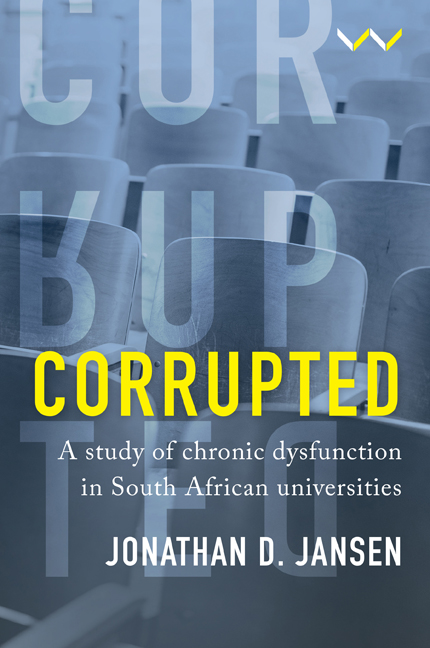Book contents
- Frontmatter
- Contents
- Acknowledgements
- Acronyms and Abbreviations
- Map: South African Universities
- Chapter 1 A Study of Chronic Dysfunction in Universities
- Chapter 2 Historical Roots of Dysfunction: Shaping the South African University
- Chapter 3 Dysfunctionality in Universities: A Political Economy Perspective
- Chapter 4 A Personal Journey Through the Political Economy of Universities
- Chapter 5 Casting Long Shadows: How History Shapes the Politics of Universities In South Africa
- Chapter 6 The University as a Concentrated and Exploitable Resource
- Chapter 7 The University as a Criminal Enterprise
- Chapter 8 The Micropolitics of Corruption in Universities
- Chapter 9 The Twin Roots of Chronic Dysfunctionality in Universities
- Chapter 10 Rethinking and Rebuilding Dysfunctional South African Universities
- Appendices
- Notes
- References
- Index
Chapter 3 - Dysfunctionality in Universities: A Political Economy Perspective
Published online by Cambridge University Press: 29 November 2023
- Frontmatter
- Contents
- Acknowledgements
- Acronyms and Abbreviations
- Map: South African Universities
- Chapter 1 A Study of Chronic Dysfunction in Universities
- Chapter 2 Historical Roots of Dysfunction: Shaping the South African University
- Chapter 3 Dysfunctionality in Universities: A Political Economy Perspective
- Chapter 4 A Personal Journey Through the Political Economy of Universities
- Chapter 5 Casting Long Shadows: How History Shapes the Politics of Universities In South Africa
- Chapter 6 The University as a Concentrated and Exploitable Resource
- Chapter 7 The University as a Criminal Enterprise
- Chapter 8 The Micropolitics of Corruption in Universities
- Chapter 9 The Twin Roots of Chronic Dysfunctionality in Universities
- Chapter 10 Rethinking and Rebuilding Dysfunctional South African Universities
- Appendices
- Notes
- References
- Index
Summary
In its simplest form, political economy can be described as the relationship between power and resources. More extensive reflections on the subject define it as ‘the study of the social relations, particularly the power relations, that mutually constitute the production, distribution, and consumption of resources’. Yet another authority places emphasis on the processes that constitute political economy: ‘all the activities of cooperation, conflict and negotiation involved in decisions about the use, production and distribution of resources’.
With these framing ideas in mind, this work applies a political economy perspective to investigate the micropolitics of a particular institution, the university. It examines not only the relationship between power and resources, but how that interaction contributes to chronically dysfunctional institutions. However, in the course of this study, existing conceptions of political economy were found to be somewhat too restrictive for the study of universities in highly contested environments in developing countries like South Africa.
A review of standard texts on the subject typically takes the reader on an intellectual tour of the major traditions, starting with the classical political economy of Adam Smith and David Ricardo, and including the Marxian political economy first developed by Karl Marx and Friedrich Engels. Between and beyond these two well-established traditions, there are variations, critiques and departures, including feminist political economy, environmental political economy, and moral political economy. In these readings, and their rebuttals, the state and markets feature prominently as the focus of analysis. There is seldom any attention paid to school education as the subject of political economy outside the interests of government funding agencies. One exception is the landmark study of Samuel Bowles and Herbert Gintis, Schooling in Capitalist America, which remains a classic reference point for students of the political economy of education.
On the other hand, the term ‘political economy of higher education’ is often loosely applied to externalities such as the global knowledge economy or the financing of higher education. But there are few studies that turn political economy inwards, to the study of the nexus between power and resources inside higher education institutions. By applying a political economy analysis to dysfunctional universities, therefore, this book expands the perspective to a specific kind of institution (the university) by undertaking an in-depth examination of the interplay between power and resources.
- Type
- Chapter
- Information
- CorruptedA Study of Chronic Dysfunction in South African Universities, pp. 29 - 58Publisher: Wits University PressPrint publication year: 2023



